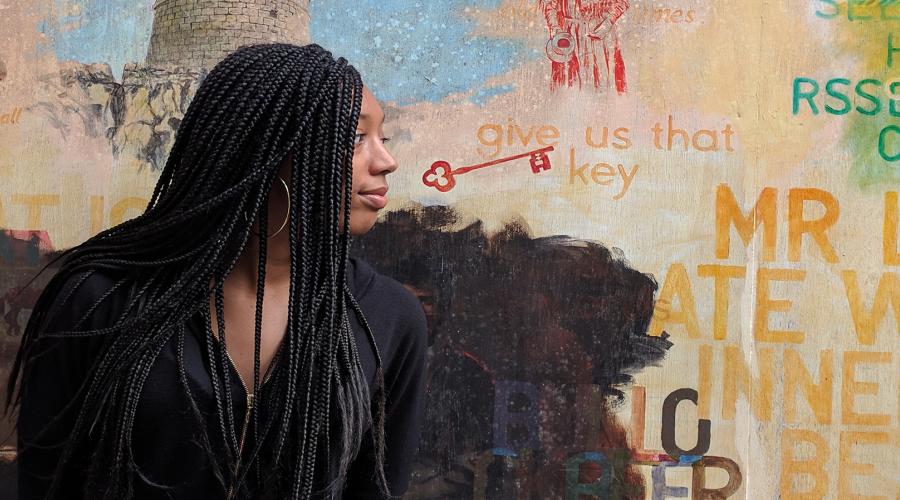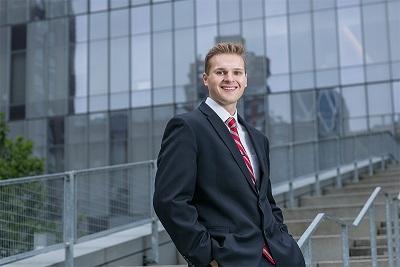
Learning in an International Environment
A semester at University College Dublin was a life-changing experience for Jaylexia Clark ’19.
She was among ILR School juniors and seniors studying abroad in the fall 2017 ILR/UCD Semester in Dublin Program. It immerses students in Irish culture and educates them about international labor relations, including hot-button issues such as Brexit, through classes at the Lochlann Quinn School of Business at UCD.
In the Dublin program, students earn ILR School credits through three required classes – European Industrial Relations and Human Resource Management, Multinational Enterprises in the Global Economy, and Irish History. The students also take one or two electives from an ILR School-approved list of courses.
During their semester, Clark and Nick Martin ’19 attended a three-day meeting with European Union representatives at the European Parliament in Brussels. A second field trip, to the European University Institute in Florence, Italy, was added to the program last fall.
Clark and Martin said the UCD experience builds on and goes beyond lectures, classroom discussions and field trips. They made new and lasting friendships with their professors and European classmates, they met students from all over the world during UCD social programs and they savored weekend trips across Ireland and other European countries.
“It was a great opportunity to learn more about international labor relations and grow as a person,” said Clark, now a UCD student ambassador for North America. “I returned from Dublin with a deeper understanding of Europe and how it compares with the U.S., and where I want to go with my career.”
Clark said a conversation she had with a taxi driver in Dublin was a turning point in her semester. “He took pride in knowing that he was offering safe and reliable transportation because Ireland has vehicle insurance and maintenance laws that protect the taxi industry and its customers,” she said. “That chance meeting helped me look beyond the broader concepts and understand how labor laws impact real lives.”
Martin had a similar experience listening to members of the European Parliament in Brussels talk about crafting regulations involving multiple countries. “I realized that decisions made about government and company policies have far-reaching consequences. How do they balance so many perspectives at once? It’s a huge responsibility, regardless of the scale of the social impact of each decision.”
The Dublin program, launched in 2007, was the first international study abroad program ILR offered, said Brigid K. Beachler, managing director of ILR Off-Campus Credit Programs.
“When we were designing the program, we wanted to create an opportunity for students to continue learning about ILR issues, but from a comparative and international perspective,” Beachler said. “Our students recognize that there are interesting and important political, economic and social issues affecting Ireland and Europe right now and they want to take this unique opportunity to study there.”
Clark and Martin said Brexit was the key topic during their time in Ireland. “The people were unsure of how the process would unfold, Martin said. “The European Union representatives we spoke with said the EU is steadfast in its commitments and will continue to operate and function well, with or without the United Kingdom.”
Clark and Martin said the Dublin experience made an impact on their career plans. Clark plans to pursue a doctorate in sociology, and then hopes to work for the International Labor Organization before starting a teaching career.
Martin said he grew more focused on career plans after Dublin. “I am looking at companies that I know have opportunities to work abroad in human resources,” he said.
The ILR program attracts students studying different ILR issues, Beachler said. “Some are focused on the corporate side of our curriculum and others are interested in learning more about global labor relations issues.”
The Dublin program helps broaden the education of ILR students and international experience on resumes often provides an edge. “So many of the companies that our students are interested in and interviewing with are global in nature,” Beachler said. “Our students now have an understanding of the world of work, from the perspective of the European Union, and we see employers who are looking for that kind of background.”

“In addition, I think the program shows that students like Jaylexia and Nick have a certain level of adaptability to be in an international environment,” she said. “They gain cross-cultural skills and are adventurous; these are soft-skills many organizations are looking for that when they’re hiring as well.”


